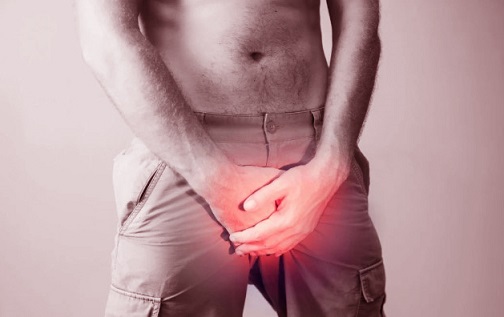COVID-19 Causes Testicular Inflammation Leading to Testicular Tissue Damage and Decreased Fertility
Nikhil Prasad Fact checked by:Thailand Medical News Team Dec 24, 2024 11 months, 4 weeks, 16 hours, 11 minutes ago
Medical News: The COVID-19 pandemic has left a profound mark on humanity, primarily due to its respiratory complications. However, scientists have uncovered that SARS-CoV-2, the virus causing COVID-19, does more than harm the lungs. Recent studies reveal that the virus also affects male reproductive health, particularly the testes, leading to significant implications for fertility.
 COVID-19 Causes Testicular Inflammation Leading to Testicular Tissue Damage and Decreased Fertility
COVID-19 Causes Testicular Inflammation Leading to Testicular Tissue Damage and Decreased Fertility
Researchers from the Kurdistan University of Medical Sciences in Iran conducted a groundbreaking study examining the impact of COVID-19 on the testicular tissue of men suffering from azoospermia, a condition where no sperm is present in the ejaculate. This
Medical News report delves into their findings, providing insight into the alarming consequences of the virus on male reproductive health.
COVID-19 and Male Reproductive Vulnerability
COVID-19 targets tissues with high levels of angiotensin-converting enzyme 2 (ACE2) receptors, a characteristic shared by the lungs, kidneys, and notably, the testes. These receptors are abundant in both germinal and non-germinal cells within the seminiferous tubules of the testes, making them susceptible to viral invasion. The researchers highlighted that the virus’s entry triggers a cascade of inflammatory responses, leading to tissue damage and impaired function.
This study, conducted at the Besat Infertility Treatment Center, analyzed testicular tissue samples from 41 azoospermic men, divided into two groups - 20 infected with COVID-19 and 21 who were not. The aim was to investigate how the virus affects inflammatory markers, particularly cyclooxygenase-2 (COX-2) and mast cells, within the testes. The findings are significant for understanding the virus’s systemic effects and developing interventions to mitigate its reproductive consequences.
The Study Methodology: A Closer Look
The researchers meticulously collected and analyzed testicular tissue samples using advanced histological and immunohistochemical techniques. Testicular biopsies were performed under sterile conditions, with samples processed for both mast cell counting and COX-2 expression analysis. Toluidine blue staining was employed to visualize mast cells, while immunohistochemical staining highlighted COX-2 protein levels.
Using statistical tools like SPSS, the study compared results from COVID-19-infected and non-infected individuals, focusing on inflammation markers. The findings revealed significantly higher levels of both mast cells and COX-2 expression in the testicular tissue of COVID-19-infected individuals, indicating a pronounced inflammatory response.
Key Findings: COVID-19’s Assault on Testicular Health
The study’s results are both alarming and revealing:
-Elevated COX-2 Levels: The COVID-19-infected group showed significantly higher COX-2 gene expression l
evels compared to the non-infected group. COX-2, a key enzyme in producing pro-inflammatory prostaglandins, disrupts normal tissue function and contributes to cellular damage.
-Increased Mast Cell Count: Mast cells, which play a pivotal role in immune responses, were more numerous in the testicular tissue of COVID-19 patients. These cells release inflammatory mediators such as histamines and cytokines, exacerbating tissue inflammation and damage.
-Inflammatory Cascade: The combined increase in COX-2 expression and mast cell infiltration creates a damaging inflammatory environment in the testes. This environment impairs spermatogenesis, the process of sperm production, and disrupts the blood-testis barrier essential for protecting germ cells.
-Potential Long-term Effects: The study suggests that chronic inflammation in the testes could lead to fibrosis, hormonal imbalances, and irreversible damage to spermatogenic cells. This raises concerns about the potential for long-term or even permanent infertility in men recovering from COVID-19.
Implications for Male Fertility
The findings underscore the urgent need for reproductive health monitoring in men recovering from COVID-19. Azoospermic men, already at risk for fertility issues, may face compounded challenges due to the virus-induced inflammation. This study adds to growing evidence that COVID-19 can have lasting effects on male reproductive health, highlighting the need for early interventions to preserve fertility.
Moreover, the identification of COX-2 and mast cells as critical markers of inflammation opens doors for potential therapeutic strategies. Targeting these inflammatory pathways with anti-inflammatory treatments or mast cell stabilizers could mitigate testicular damage and improve reproductive outcomes.
The Bigger Picture: COVID-19 as a Multisystem Disease
While much attention has been given to the respiratory and cardiovascular effects of COVID-19, this study underscores the virus’s potential to disrupt other critical systems. Male reproductive health, a less-discussed aspect, now emerges as a key area of concern. The researchers call for interdisciplinary collaboration among infectious disease specialists, urologists, and reproductive endocrinologists to address these issues comprehensively.
Study Limitations and Future Directions
The researchers acknowledge certain limitations in their study. The small sample size may limit the generalizability of the findings, and the focus on molecular markers without assessing functional fertility outcomes leaves some questions unanswered. Larger, longitudinal studies are needed to understand the long-term effects of COVID-19 on male fertility and explore how different variants of the virus may influence testicular inflammation.
Future research should also investigate potential interventions to counteract these effects. Anti-inflammatory agents, antioxidants, and lifestyle modifications could play a role in preserving testicular health. Additionally, understanding the recovery trajectory of testicular inflammation post-COVID-19 infection could provide valuable insights for clinical management.
Conclusion: The Unseen Consequences of a Global Pandemic
The findings from this study provide compelling evidence that COVID-19 extends its impact beyond the respiratory system, affecting male reproductive health in significant ways. The elevated COX-2 expression and mast cell count observed in the testicular tissue of COVID-19-infected individuals highlight the virus’s ability to induce severe inflammation, with potential consequences for fertility.
This research emphasizes the importance of monitoring reproductive health in men recovering from COVID-19, particularly those with pre-existing conditions like azoospermia. By shedding light on the mechanisms of testicular inflammation, the study paves the way for targeted interventions that could mitigate these effects and preserve fertility in affected individuals.
The study findings were published in the peer-reviewed journal: Cellular and Molecular Biology.
https://cellmolbiol.org/index.php/CMB/article/view/5726
For the latest COVID-19 News, keep on logging to Thailand
Medical News.
Read Also:
https://www.thailandmedical.news/news/covid-19-news-study-unveils-the-impact-of-inflammatory-cytokines-on-testicular-cells-in-covid-19-male-fertility-at-risk
https://www.thailandmedical.news/news/covid-19-news-groundbreaking-danish-study-shows-than-men-with-mild-covid-19-infections-still-ended-up-with-impaired-testicular-function
https://www.thailandmedical.news/news/texas-study-finds-that-sars-cov-2-literally-damages-the-testes-and-testicular-tissues-in-a-variety-of-way-and-also-the-blood-testes-barrier
https://www.thailandmedical.news/news/texas-study-finds-that-sars-cov-2-literally-damages-the-testes-and-testicular-tissues-in-a-variety-of-way-and-also-the-blood-testes-barrier
https://www.thailandmedical.news/news/breaking-hong-study-shockingly-shows-sars-cov-2-infection-causes-male-hamsters-testicles-to-shrink-human-males-risk-being-eunuchs
https://www.thailandmedical.news/news/breaking-brazilian-and-american-study-discovers-that-the-testes-of-males-could-be-viral-sanctuaries-for-the-sars-cov-2-virus
https://www.thailandmedical.news/news/coronavirus-news-could-covid-19-create-a-whole-generation-of-virally-castrated-eunuchs-study-confirms-male-fertility-is-at-risk
https://www.thailandmedical.news/news/breaking-news!-latest-research-published-by-chinese-scientists-say-coronavirus-might-render-certain-male-patients-infertile
